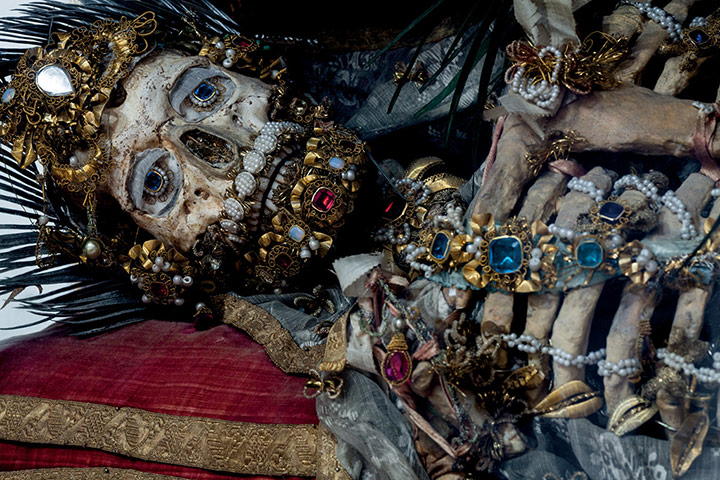Traveling the Path to Catholicism

Q: Recently I saw a picture showing the Rite of Election at the cathedral. Would you please explain more about the Rite of Election and RCIA? When I was growing up, we did not have such a program.
The Rite of Christian Initiation for Adults (RCIA) is a formal program of catechetical instruction, ascetical practice (prayer and spirituality), and liturgies whereby adults — called catechumens — are formally admitted into the Church and receive the sacraments of initiation — baptism, confirmation, and holy Eucharist. (The sacrament of penance is received later since baptism washes away all sin — original sin and actual sin.)
The Constitution on the Sacred Liturgy of the Second Vatican Council decreed, “The catechumenate for adults, comprising several distinct steps, is to be restored and brought into use at the discretion of the local ordinary. By this means the time of the catechumenate, which is intended as a period of suitable instruction, may be sanctified by sacred rites to be celebrated at successive intervals of time” (No. 64).
This mandate first calls to mind a “restoration” of something that one time existed in the Church. St. Paul in his Letter to the Galatians mentioned that “the man instructed in the Word [i.e. a catechumen] should share all he has with his instructor” (6:6), indicating a formal preparation for entrance into the Church. St. Justin Martyr (d. c. 165) in his first Apology described the catechumenate: “Those who are persuaded and believe in the truth of our teachings and sayings undertake to live them accordingly; they are taught to ask, with fasting, for the remission of their sins, we also praying and fasting with them. Then they are led by us to a place where there is water, and they are regenerated in the same way as we have been regenerated.” Tertulian (d. c. 220) coined the title “catechumen” and reproached the pagans for not making a distinction between them and the “faithful.” Remember that during this time, the Church was under persecution by the Roman Empire and was confronted with various heresies; therefore, the Church wanted a very formal, careful period of instruction to prevent the infiltration of both persecutors and heretics.
The catechumens themselves were distinguished between inquirers (audientes), those initially interested in the faith, and actual catechumens who had made an initial commitment to pursue the faith. The catechumenate involved several stages, each with a catechetical, ascetical and liturgical facet, and usually lasted three years. During this time, they could attend Mass through the Liturgy of the Word, but could not participate in the Liturgy of the Eucharist. At the end of this period, the catechumens were examined, not so much for their knowledge, but to determine whether they lived the faith devoutly and had a sincere conviction of faith. If the examination was favorable, the catechumen became a candidate for baptism, received further instruction and was baptized at the Easter Vigil Mass.
After the legalization of Christianity in 313, the catechumenate began to fall into disuse for various reasons. The fear of persecution was greatly lessened. Baptism of infants became the norm with adult baptism waning. Conversion of the barbarian invaders precluded any prolonged period of instruction (actually, Pope Gregory the Great [d. 604] mandated only a 40-day preparation period for these people). By the Middle Ages, the catechumenate had disappeared, with only traces remaining in the rites of baptism and formal reception into the Church.
Given this brief history, the Second Vatican Council saw the need to restore the formal catechumenate for adults. In 1972, the Congregation for Divine Worship issued a new rite, approved by Pope Paul VI. As in the early Church, RCIA is a gradual process that involves the whole community of the faithful. Not only does RCIA prepare individuals for entrance into the Church, it allows the members of the Church to renew their faith.
During the course of the RCIA program, the individual follows a spiritual journey of “steps” accomplished through defined periods punctuated with formal rites. The first period is the precatechumenate, when candidates inquire about the faith and receive evangelization. Hopefully, the person comes to that initial conversion and step of faith, aided by the grace of God. This period ends with the Rite of Acceptance into the Order of Catechumens when the candidates publicly declare their intention to enter the Church.
This Rite of Acceptance then begins the Period of the Catechumenate, during which the catechumens receive catechetical, ascetical and liturgical training. Catechetical instruction is of the utmost importance: “This catechesis leads the catechumens not only to an appropriate acquaintance with dogmas and precepts but also to a profound sense of the mystery of salvation in which they desire to participate” (RCIA, No. 75). During this time, the catechumens should undergo a conversion of mind and action, becoming acquainted with the teachings of the faith and acquiring a spirit of charity. The sponsors and parish community assist the catechumens by their example and support. At Sunday Mass, the catechumens receive special exorcisms, blessings and anointings following the homily; however, after the Liturgy of the Word, they leave the Church. The Catechumenate may extend over a prolonged period of time, even years if necessary.
The Rite of Election closes the Period of Catechumenate. This rite normally coincides with the first Sunday of Lent. At this rite, upon the testimony of sponsors and catechists and the catechumens’ affirmation of their intention to join the Church, the Church makes its “election” of these catechumens to receive the sacraments of initiation. In the presence of the bishop (or his delegate), they inscribe their names in the Book of the Elect at the cathedral as a pledge of fidelity. Now the catechumens are called “the elect” or “the illuminandi” (“those who will be enlightened”). They now begin a Period of Purification and Enlightenment — the final, intense preparation for the reception of the sacraments of initiation. On the next five Sundays of Lent, three scrutinies (rites for self-searching and repentance) and the presentations of the Creed and Lord’s Prayer take place. This period concludes with the celebration of the sacraments of initiation at the Easter Vigil.
After the Easter Vigil, the newly baptized and confirmed members of the Church (technically called neophytes) enter the Period of Postbaptismal Catechesis or Mystagogy. The neophytes grow in their understanding of the mysteries of the faith and strengthen their bonding with the rest of the faithful. They should enter more fully into the life and unity of the Church. This period normally ends around Pentecost.
The RCIA is a spiritually moving process beneficial to the whole parish community. As we draw closer to the celebration of Easter, let us pray in particular for those elect who will be entering our holy Catholic Church this Easter.









